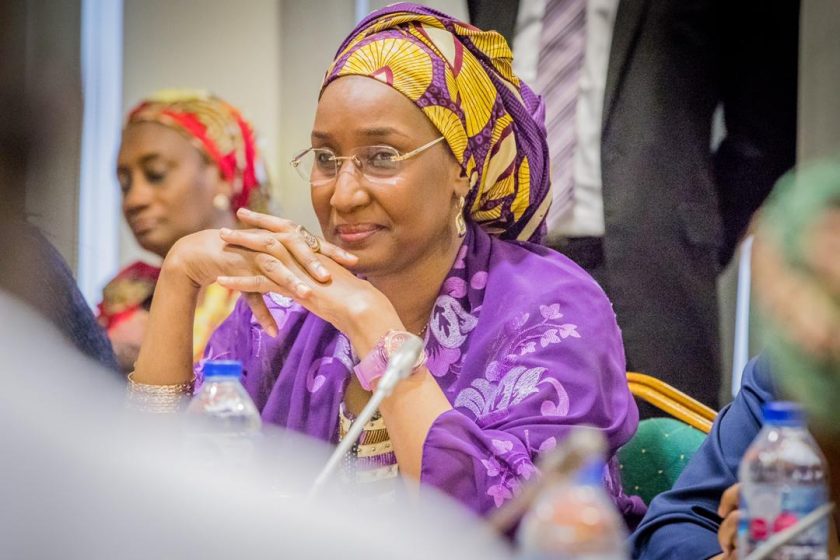The Minister of Humanitarian Affairs, Disaster Management and Social Development, Sadiya Farouq, says the relief items being given by the federal governments as palliative over the coronavirus-induced lockdown would reach only 25 per cent of Nigerians.
The minister said this while addressing State House correspondents in Abuja on Wednesday.
She also said state governments would now handle the distribution of the items to beneficiaries in their domains.
“It cannot go round everywhere but we are starting from somewhere. 25 percent of, let’s say the location of Lagos State, for example, is what is going to benefit from this intervention that we are doing. Going forward, we might expand it but this is what is obtainable for now,” she explained.
President Muhammadu Buhari in his second national address on Easter Monday said he was aware of the impact of the lockdown especially on those living on daily wages.
“No country can afford the full impact of a sustained restriction of movement on its economy. I am fully aware of the great difficulties experienced especially by those who earn a daily wage such as traders, day workers, artisans and manual workers,” he said.
He also announced that National Social Register (NSR), which the World Bank had assisted in compiling, would be expanded by one million households to 3.6 million, to accommodate more Nigerians considered to be the most affected in the ongoing lockdown in three states.
The NSR is a World Bank assisted project that helps in selecting and identifying vulnerable persons in a given community.
Many Nigerians have since taken to social media to demand accountability and transparency in the distribution of the palliative items.
The leadership of the National Assembly had also called for a total review of the process.
Similarly, state governors also urged the president to reform the process of the distribution of the palliatives.
Palliatives over to Governors
The minister said her ministry had begun the ‘digitisation’ of the cash transfers and other programmes under the NSIP.
Ms Farouq said her ministry intends to hand over the distribution of food relief items to state governments, so as to address the challenges associated with the exercise in the past.
“On the issue of palliatives in terms of food relief, going forward, we are going to hand over the food items to the states because issues have come up, as at yesterday (Monday),
“Our people were mobbed, some of them were attacked in the course of carrying out this assignment so the general conclusion is that we give this food relief directly to the state governments for them to distribute to the beneficiaries,” she added.
Urban Areas To Benefit More
Ms Farouq also said going forward, distribution of food items would majorly target poor persons living in urban communities.
According to her, the decision followed a presidential order.
“You are aware that the President in his broadcast of Monday 13th April, directed that we expand the beneficiaries of the conditional cash transfer by one million and in this regard, we are going to focus more now on the urban poor.
“These are people who depend on the informal sector to earn their livelihood; they are daily wage earners and these are the people that we are really going to focus more on as well as people living with disabilities.”
More Resolutions
Ms Farouq also spoke on the efforts of the government to digitalise the channel of disbursing cash transfers palliatives.
According to her, the Ministry has adopted three options in selecting and distributing funds to the beneficiaries under the scheme.
“Well, we have three options; one, we are going to use the national social register that we already have, two, we are also going to focus on the urban poor as I mentioned, by using their verified BVN accounts to get them, that is, people that have an account balance of N5, 000 and below.
“We are also using the mobile networks, to know people that top up the credit units for their phones with maybe N100 or less. Those are also people that we consider to be poor and vulnerable.
“So, these are the three options that we are exploring and I am sure that by the time we get this data we will be able to give this intervention.” Ms Farouq said.
EU Donation
Shedding more light on the N21 billion support given to Nigeria by the European Union to fight COVID-19, the minister said the donation is tied to medical equipment and provision of structures that will help Nigeria fight the deadly disease.
“This donation is coming in kind, basically by way of medical equipment and also some structure to be put in place as a response to this COVID-19 pandemic.
“In that intervention, there are also humanitarian issues that would be addressed. As you are aware, this is a health emergency but at the same time it is also a humanitarian emergency. So the Ministry is going to come in here because we are to coordinate all humanitarian interventions coming into the country by way of making sure that such interventions get to the poor and vulnerable in our society,” she said.
Source: Premium Times
Follow the OSUNDOTLIFE channel on WhatsAppKindly share this story | All rights reserved. This material, and other digital content on this website, may not be reproduced, published, broadcast, rewritten or redistributed in whole or in part without prior express written permission from OSUNDOTLIFE.
Contact: editor@osun.life
WhatsApp: 📲 +2348092333666

